The marketing world has crossed a tipping point: what began as experimental AI adoption in 2023-2024 has evolved into a strategic necessity by 2026. Nearly 90% of marketers now integrate AI into their processes in some way or form.
But behind these adoption numbers lies a more complex story, one of remarkable productivity gains, persistent skills gaps, and emerging opportunities that will define the next decade of marketing.
This detailed report examines the latest AI marketing statistics using real data, revealing not just what's happening but why it matters for your business strategy in 2026.
We update this content every quarter to keep it fresh and relevant. All the current data reflects Q1 2026 industry reports and verified sources.
The AI marketing landscape has reached substantial scale. The global AI marketing market in 2026 is projected to be approximately $64.6 billion. In the long run, it’s expected to reach $107.5 billion by 2028 (Source). That’s a significant growth metric for three years, and it reflects a fundamental restructuring of how marketing organizations operate. 2026 has already begun to see this growth.
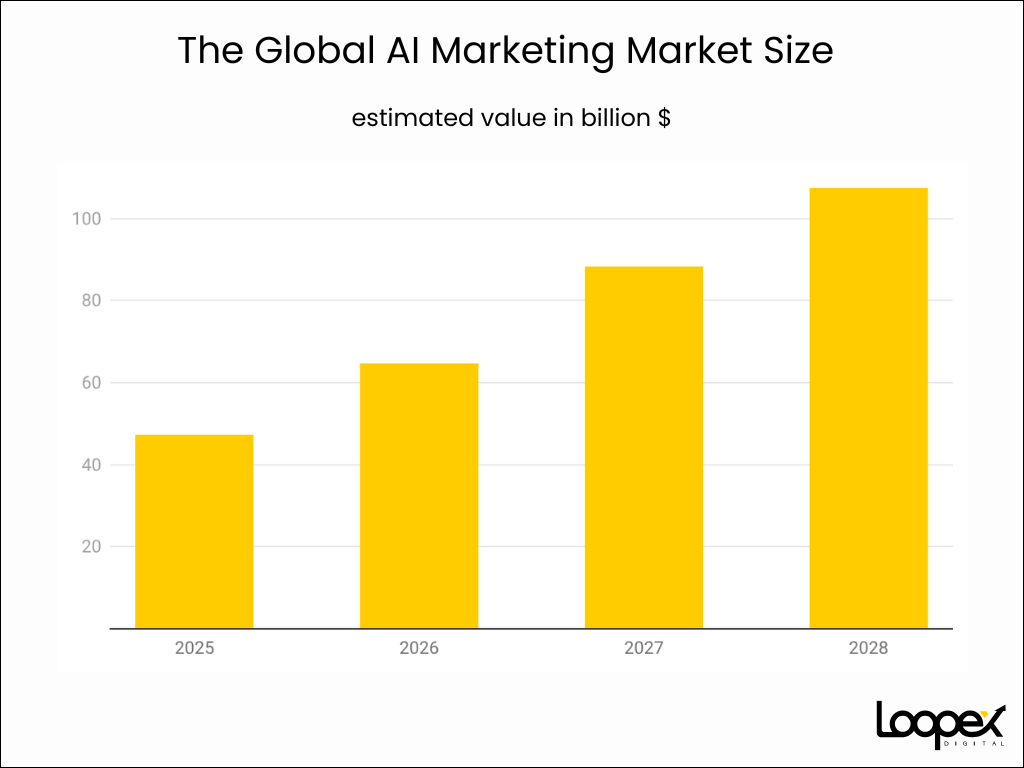
In terms of demographic distribution, the United States leads global AI marketing adoption, accounting for $73.98 billion of the AI market and projecting a 26.95% CAGR through 2031. However, growth is accelerating worldwide, with global AI adoption by organizations expanding at a CAGR of 35.9% between 2025 and 2030. (Source)
The story of AI adoption in marketing varies significantly by company size and industry. 68% of sales and marketing professionals now use AI daily at work. Interestingly, only 17% of these professionals received comprehensive, job-specific AI training.

The implementation depth differs dramatically:
The productivity benefits of AI in marketing extend far beyond basic automation. Marketing teams are 44% more productive thanks to AI, with the average professional saving 11 hours per week (Source). This time savings translates to:
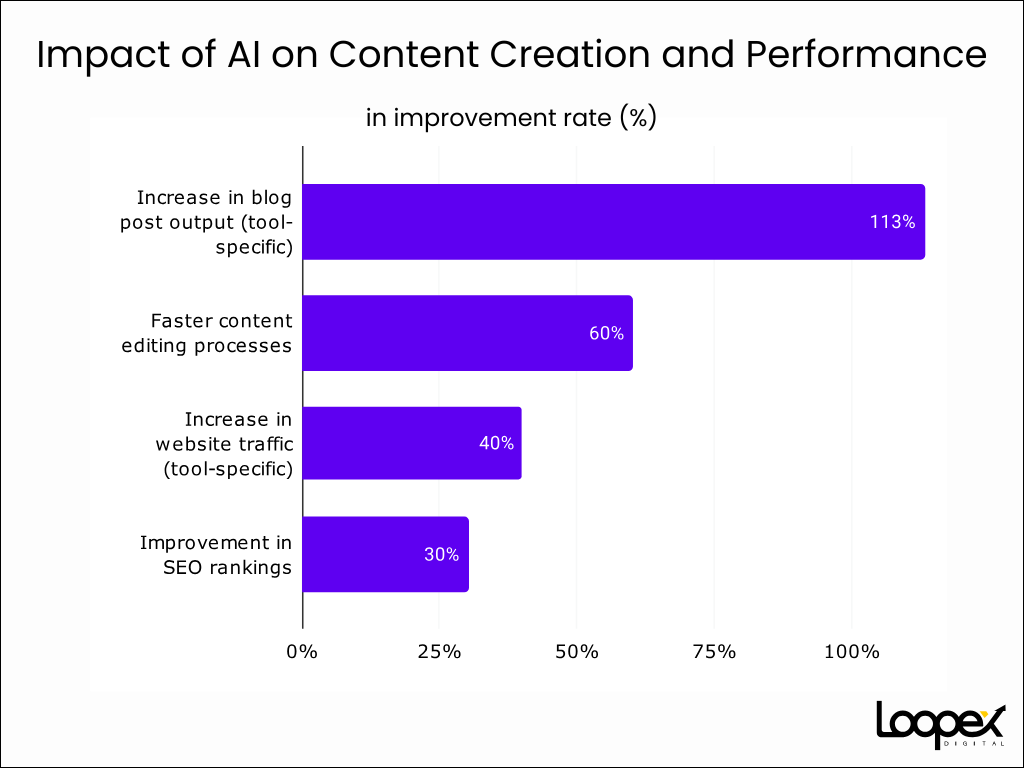
The impact on marketing roles has been more nuanced than simple job displacement. 75% of staff effort has shifted from production to strategy in organizations using AI-driven marketing operations. This reallocation enables:
AI has fundamentally changed SEO and content marketing workflows. 58% of marketers now use AI for content ideation and optimization, and search interest in "AI SEO tools" has risen by 42% since the beginning of last year (Source).
AI SEO tools focused on content writing enable marketers to generate 10,000 words in a single session, maintaining quality standards that previously required human-only creation. However, Google search results now include 19% AI-generated content, creating new challenges for differentiation.
Traditional keyword research has evolved into intent-driven content strategies. AI tools analyze semantic relationships and predict trending keywords before they become widely competitive.
AI-powered technical SEO audits identify and often resolve issues faster than manual processes, and some tools can predict algorithm changes before they occur.
7 most in-demand/searched AI marketing tools based on our research (Q1 2026):
AI marketing statistics show that Paid advertising represents one of AI's most measurable areas of impact. 47% of marketers use AI for bid optimization and creative testing, delivering substantial performance improvements:
7 most in-demand AI tools to help with paid ads and media buying based on our research (Q1 2026):
Email marketing has experienced dramatic AI-driven improvements. Personalized emails show 29% higher open rates and 41% higher click-through rates compared to non-personalized versions (Source). AI helps marketers with this:
7 most in-demand email marketing and CRM AI tools based on our research (Q1 2026):
AI chatbots have reached widespread adoption with measurable satisfaction improvements. 80% of IT companies adopted AI chatbots for marketing in the last year, with current users reporting:
7 most in-demand customer service AI tools and AI chatbots based on our research (Q4 2025):
Marketing budgets in 2025 and their planning for 2026 reflect strategic reallocation rather than expansion. While total marketing budgets hold steady at 7.7% of company revenue, internal allocation has shifted dramatically.
9% of total marketing budgets now go to investment in AI tools, representing the fastest-growing category in marketing spend. This includes (Source):
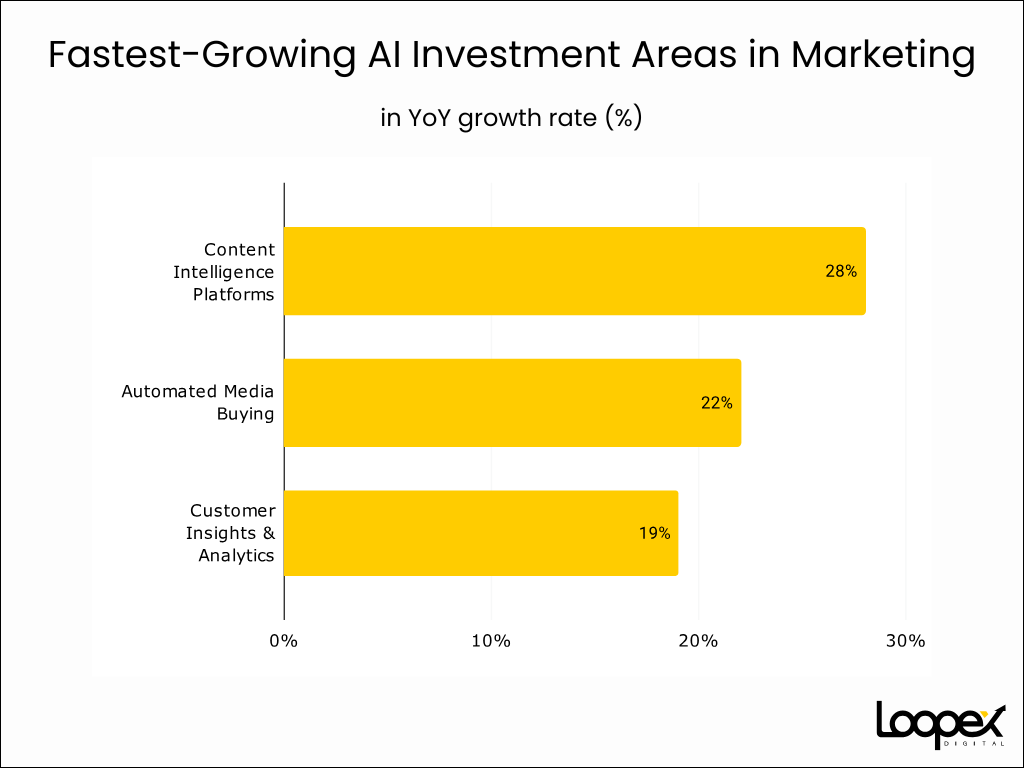
Martech spending represents 22% of marketing budgets, with increasing focus on AI-integrated platforms rather than standalone point solutions.
Moreover, a 12% increase in martech spend is projected for the rest of 2026, with significant portions allocated to employee training and capability development.
Based on the latest AI marketing statistics, the financial returns from AI marketing investments have become increasingly measurable:
Retail leads AI marketing adoption with measurable results (Source):
E-commerce companies leverage AI for dynamic pricing, inventory optimization, and predictive customer lifetime value calculations, creating comprehensive AI-driven growth strategies.
B2B SaaS companies show sophisticated AI implementation (Source):
The complex B2B sales process benefits significantly from AI's ability to analyze buyer behavior patterns and optimize touchpoint timing.
Despite regulatory constraints, financial services show strong AI marketing adoption (Source):
Financial institutions focus on AI applications that enhance customer experience while maintaining regulatory compliance.
The most significant barrier to AI marketing success isn't technology; it's human capability. 58% of marketers cite skills gaps as their top challenge, despite high adoption rates:
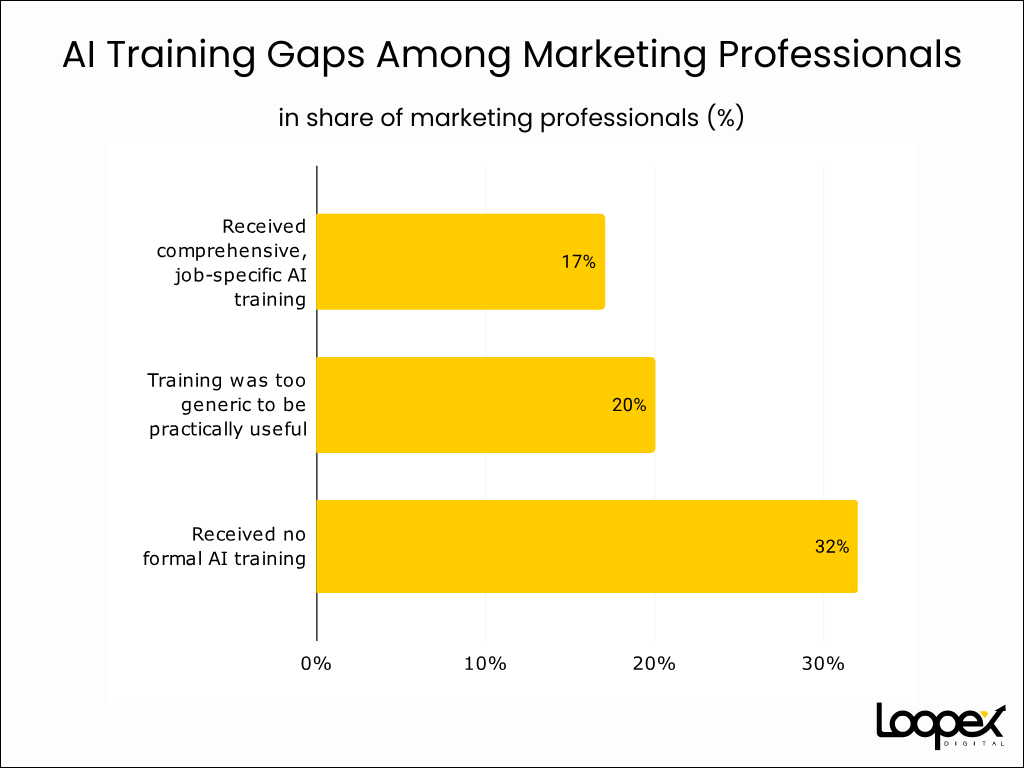
Organizations that invest in employee AI training report 43% higher success rates in deploying AI projects, suggesting that the skills gap directly impacts ROI.
Forward-thinking organizations are addressing the skills gap through targeted investments:
The search landscape is experiencing fundamental shifts driven by AI:
The AI marketing tool ecosystem shows signs of market maturation:
As AI adoption scales, governance becomes critical:
75% of marketing teams still lack an AI roadmap for the next 1-2 years, with (Source):
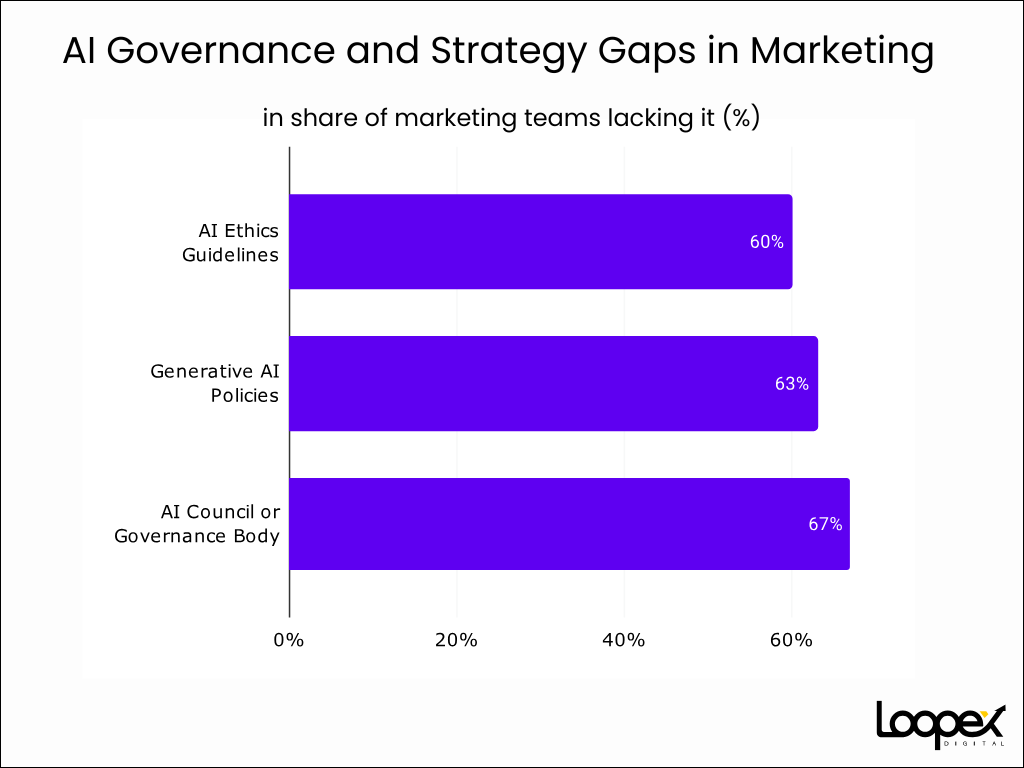
Moreover, legislative mentions of AI rose 21.3% across 75 countries since 2023, creating increasing compliance requirements for marketing organizations.
There are privacy and data concerns as well:
Successful AI marketing implementation requires strategic prioritization:
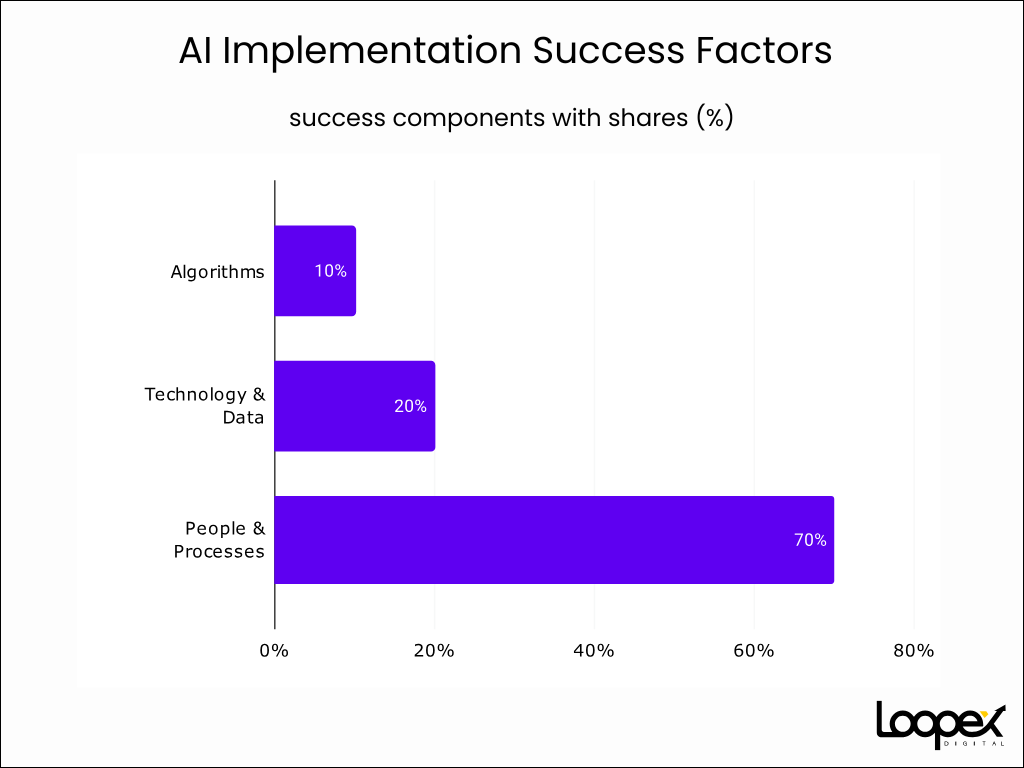
AI marketing requires new measurement approaches:
AI marketing statistics lead to one conclusion: AI in marketing is a performance driver in 2026.
Bottom Line: AI rewards strategy, which is what you should focus on. And if you need help, feel free to contact our agency to get support in reaching your goals.
Our blog covers a combination of industry trends and professional insights from behind-the-scenes experiences. We provide weekly updates on link building, content marketing, on-site and technical SEO, and more! Sign up for our newsletter and join our LinkedIn to be on top of industry trends!
Submit the form - Get Free Proposal
%202.png)
24 hours

Submit the form - Get Free Proposal
%202.png)
24 hours